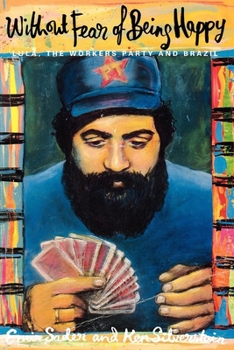Without Fear of Being Happy
Select Format
Select Condition 
Book Overview
The Brazilian Workers Party is the most important political formation to emerge in Latin America for many years. Under the charismatic leadership of an ex-metalworker and union official, Luis Inácio da Silva, known simply as "Lula" by the Brazilian masses, the Workers Party won 31 million votes to come within three per cent of winning the 1989 presidential election on a bold anti-capitalist platform. Taking its title from the Workers Party's slogan in these elections, Without Fear of Being Happy shows how the party's development reflected the increasing social inequalities under Brazil's military dictatorship of 1964 to 1985, and gives an account of the wave of strikes organized by Workers Party leaders which accelerated the collapse of the generals' regime. Since its formation in 1980, the party has brought together trade unionists, landless peasants, shantytown activists, the progressive wing of the Catholic Church and human rights campaigners. Drawing on the experiences and aspirations of this wide coalition, it has attempted to redefine a socialist perspective in a time of triumphant neo-liberalism. In a detailed assessment of the organization, program and electoral prospects of the Workers Party today, Emir Sader and Ken Silverstein highlight the dilemmas it faces as a radical political force in a country who economy--the eighth largest in the West--attracts keen interest from the United States. The Workers Party's success has foreshadowed the emergence of leftwing coalitions in other countries of the region and has been an inspiration for socialists throughout the Third World. The first comprehensive account of this remarkable political phenomenon, Without Fear of Being Happy will be of lasting value to all those interested in Latin American politics and anti-imperialist strategies in the era of the New World Order.
Format:Paperback
Language:English
ISBN:0860915239
ISBN13:9780860915232
Release Date:October 1991
Publisher:Verso
Length:178 Pages
Weight:0.70 lbs.
Dimensions:0.6" x 6.1" x 9.2"
Customer Reviews
1 rating
Latin American contemporary politics
Published by Thriftbooks.com User , 24 years ago
The Worker's Party of Brazil(the partidos dos trabalhadores -PT) is one of the political organisations that has demonstrated the capacity for the Left to renovate its politics. The very success of the party created a opposition to the thought that the Left had entered in retreat since the fall of the Soviet Union or due to the crisis of the welfare state. The key event that attention to the party was the presidential election of 1989, when its main leader _ Luis Inacio Da Silv(` Lula') almost won election with 47 percent of the vote. The slogan of the 1989 presidential election is the title of the book - `Without Fear of Being Happy' (Sem medo de ser feliz). The authors go into the formation of the party and how it brought together distinct social movements activists and leftist tendencies within the party. Sader and Silverstein take back to the metal workers' strike in 1978-79, where discussion initiated about the need for a political party of the workers. From there, the party went on struggling with the institutional road and trying to accommodate its radical aim with the limits of the state institutional structures. The author devotes a chapter to the rural link of the party, which it is important to demonstrate how the party is not a party of urban workers. The authors also go into the problems that the party faced with its municipal administrations, especially in face of the internal diversity. The book also includes an interview with Lula. This is a good introductory book on the Latin American left that any student or person interested on the area would enjoy reading.






